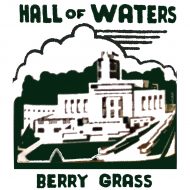BWR Interview with Berry Grass, former editor and author of HALL OF WATERS

Berry Grass has lived in rural Missouri, Tuscaloosa, and now Philadelphia. They are the author of Hall of Waters (The Operating System, 2019). Their essays and poems appear in DIAGRAM, The Normal School, Barrelhouse, Waxwing, and Sonora Review, among other publications. They are a 2019 nominee for the Krause Essay Prize. They host Tragic: the Gathering — an occasional transgender literature reading series in Philadelphia. They got their MFA in creative writing from the University of Alabama, where they were a former Nonfiction Editor of Black Warrior Review. When they aren’t presently reading submissions as Nonfiction Editor of Sundog Lit, they’re embodying what happens when a Virgo watches too much professional wrestling.
Interview by Design Editor Reilly Cox
Reilly Cox: To start things off, I think some introduction would be in order. I can say you are a poet and essayist, how you went from Midwest to Deep South to East Coast, how you’re a Virgo and pro-wrestling fan, but I’m curious how you’d introduce yourself. *hands microphone over*
Berry Grass: Hi! I am a magician of jackets, I help my wife foster kittens, I’m a transsexual metalhead, and my backyard wrestling character from back in the day was called “Reaper.” But if asked in a physical social setting where I actually have to not scare someone, I say I’m an essayist. I say that I use they/them or she/her pronouns.
RC: While at UA, you worked with BWR and since have continued your work with lit mags with Sundog Lit. How does or did this involvement shape the way you engage with your writing community?
BG: I think my experience working on lit journals has been really instrumental for me in figuring out what a literary community can look like. I value the feedback that I’m able to give writers, and I value the work of editing and curating issues. The accountability of being on a masthead means that you must constantly be able to think through and articulate your decisions and feelings, and I’ve found that to help me grow as a writer (much in the same way that teaching a creative writing workshop facilitates growth).
RC: What do you miss about Tuscaloosa? What have you found you love about Philly?
BG: I miss a lot about Tuscaloosa! I miss Catfish Heaven. I miss Archibald’s sauce. I miss biscuits. My heart will always, deeply, miss the old Egan’s. & I’m a total sports girl, so I actually do miss the Roll Tide culture! Philadelphia is a very different place, because Philadelphia is thousands of places happening simultaneously. The overall literary culture in this city might be second to none, and there’s still the possibility of just DIYing your own creative and cultural spaces. It’s a city with a substantial radical activism tradition, which I truly appreciate.
RC: In regards to your debut full-length book, Hall of Waters (out now from The Operating System), the writing leans heavily into found form, hybridity, reframing history, and—for lack of a better term—chaos. What impulse drives that chaos for you? Is it a queering of form? A reclamation? An understanding of grief?
BG: I think what might come across as chaotic in its hybridity is my attempt to make this book both very personal AND not entirely about me. So much of the book is held aloft by research, and by my goal of critiquing the skewed histories that the small towns of the midwestern United States like to tell themselves about themselves. So I’m juxtaposing these lyric memoirs along with small essays about place and truth, sometimes overlapping the two modes. I do think there’s some reclamation involved, yes!, especially in the two hermit crab essays using the historical site survey form. I’m re-claiming my childhood in my hometown as a queer childhood (though few would have articulated it as such at the time). That I am doing so while also looking intently at the complicity of white people in my hometown in reifying and maintaining white supremacy is also, probably, chaotic in some sense.
RC: What about The Operating System’s model of printing drew you to them?
BG: I think The Operating System is such a good political fit for this book, and for me! The OS calls their books “print documents,” because the overall project isn’t really to function as a normative publishing house, but an archive run by collective labor. The OS is very transparent about the labor of small press publishing. I also love that every OS book is published under a Creative Commons license. It’s fine to make copies of my book to give to your friends or your students! Reproduce it! Share it! We don’t want financial barriers to keep someone from reading. To that end, I will send anyone who asks a .pdf of the book, no questions asked.
RC: In Hall of Waters, the writing flows seamlessly between essay, poetry, and fragment. I often hear (the somewhat joking) statement that “genre is fake” and I’m curious what your beliefs around genre are. Is it still useful? Do certain writings inherently hold certain genre-centric qualities? Or…
BG: Genre is as fake as gender: which is to say it is often misunderstood… It’s real, but very permeable. As someone who staunchly prefers to work in the essay, I find real value in genre (like gender) as a means of communicating to others how you want to be seen. I want my writing to be explicitly understood as true, and I want to forge a connection between my recollections and my thinking with the reader’s recollections and thinking. I think that the pieces of this book, no matter the shape they take on the page, all have a giant handkerchief in their back pocket, flagging ESSAY to readers. So that dense lyricism or found form still feel like essay because genre let’s certain gestures and phrases (like addressing the reader directly, or acknowledging thinking right there on the page) read as essay.
RC: I often had to set down Hall of Waters while reading it, sometimes to digest a beautiful passage but oftentimes to process some brutal-yet-honest writing that engaged with personal traumas coupled with historical violences. While speaking with a professor here, the term “post-post-confessional” was brought up to describe writing that, while engaging with the “I” and the I’s lived experience, linked that personal experience with a macro concept, such as history, mythology, and abstractions. Is it fair to say you are working somewhere adjacent to the post-post-confessional tradition, or would you describe your work in different terms?
BG: You’re not the first person to tell me that they had to read Hall of Waters in small chunks. That wasn’t necessarily my intended reading experience, but I also think I pretty consistently underestimate/diminish the intensity of the trauma I’ve experienced, haha. I’m new to the term “post-post-confessional,” but I have a few thoughts about it! 1) it’s very funny to me, that many posts! It reminds me of the many very specific subgenres and sub-subgenres of heavy metal: Progressive Post-Metal, or Funeral Death Doom Metal, or Blackened Proto-Thrash Metal or etc etc etc. 2) if the term can be defined as you laid it out here, then I suppose it would be fair to say that I am working within or close to the post-post-confessional. but 3) that description just sounds a lot like the essay to me! I think for a reader to ascribe to Hall of Waters any intentional poetics would be incorrect, haha. For me, everything begins with the essay mode: it’s juxtapositions and use of space to reflect and refract thought; it’s meandering dance between the I and those macro subjects and micro subjects and the other I and the other I and maybe also the you and even more versions of the I because there’s never just one.
RC: What is something strange but wonderful that happened to you recently?
BG: I’m in book tour mode right now, so my thinking keeps drifting to the book. But it truly has been strange and thrilling to see pictures of readers with library copies of my book! I think seeing Hall of Waters in library circulation has given me more of an emotional boost than any other part of the publishing process, and it registers as strange to me because, I guess, it means that my writing is reaching more people than I thought it would, and my internal critic/Sagittarius moon is flabbergasted by it.
RC: In addition to being a writer and editor, you are also a teacher. Could you give a brief synopsis of what your teaching philosophy is?
BG: Funny you should ask; I actually stopped teaching for the time being to try and find a stable office job. I’d been adjuncting for so many years, and it gets harder and harder every year to have my labor exploited like that. I put a lot into my teaching, and I put a lot into personally investing in my students. I appreciate the hard work that goes into being a student-centered teacher, in valuing their growth and their safety to grow above anything else. That’d be my bumper sticker answer, but I don’t know when next I’ll be able to put that philosophy to work.
RC: How’re yer cats?
BG: As I answer these questions, my orange boy, Cabot, is curled up into my lap, snoozing. Winnimere is jumping up against the screen door trying to swat a fruit fly, and Fog is sitting like a little creep on the staircase because she likes to observe everything from above like somekinda gargoyle. They are perfect lil nerds, and I love them.
You can purchase HALL OF WATERS at The Operating System bookstore.
